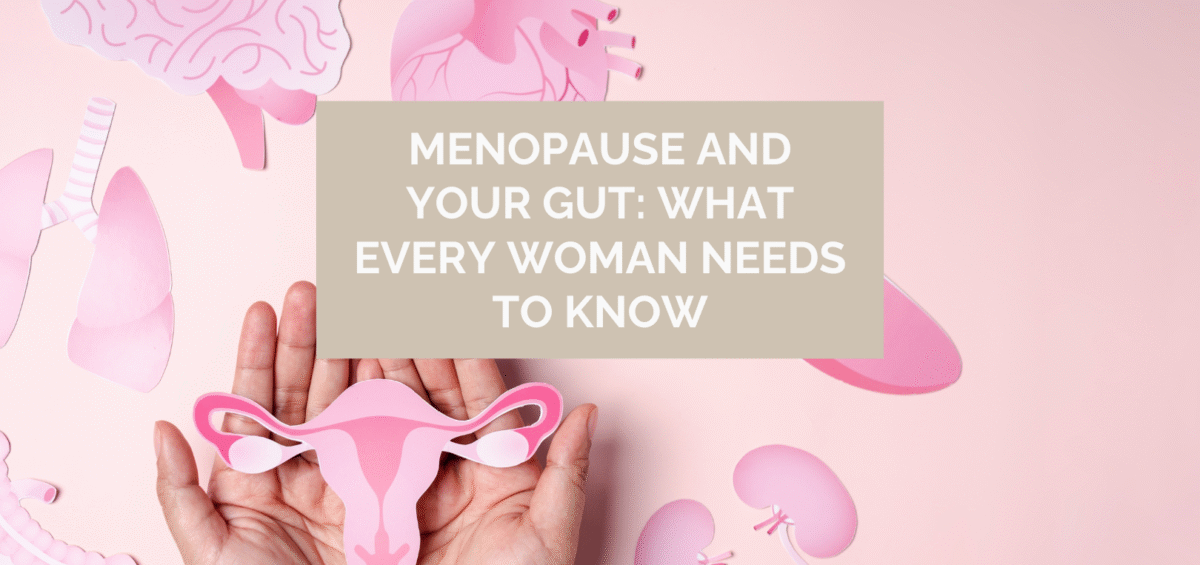Menopause is a natural part of life, but that doesn’t mean it always feels easy. From hot flushes to brain fog and mood swings, many women find their bodies changing in ways they weren’t quite prepared for. One area that often gets overlooked? Gut health.
As a dietitian, I often work with women who feel confused or frustrated by new gut symptoms in midlife, bloating, constipation, and food sensitivities that seem to appear overnight. If this sounds familiar, you’re not imagining it. There’s a powerful connection between menopause and your gut, and understanding it can help you feel more in control of your health.
Let’s explore how hormonal changes affect the gut, why it matters for your overall wellbeing, and the small, sustainable steps you can take to feel better from the inside out.
Hormones, Digestion, and Your Gut Microbiome
When oestrogen and progesterone levels begin to decline in perimenopause and menopause, your gut can feel the shift. These hormones influence how your digestive system functions, how your body processes food, and even how your gut bacteria behave.
Here’s what often happens:
- Slower digestion – You might notice your bowels are less regular or that you feel “heavier” after meals.
- Changes in gut bacteria – Your microbiome (the trillions of microbes living in your gut) shifts in response to hormonal changes, which can affect everything from immunity to nutrient absorption.
- More sensitivity – The gut becomes more reactive for some women, leading to discomfort after eating or increased IBS-type symptoms.
These changes aren’t just about digestion. They can affect your mood, energy, and even your risk of long-term health conditions.
Common Gut Symptoms During Menopause
If you’re in your 40s or 50s and your gut suddenly feels “off,” you’re not alone. Some of the most common symptoms I hear from women during this stage include:
- Bloating – That uncomfortable fullness or gassiness that seems to show up randomly.
- Constipation – A slower digestive system can leave you feeling blocked or sluggish.
- Flare-ups of IBS – Hormonal shifts, stress, and changes in eating patterns can trigger more frequent or severe IBS symptoms.
- New food sensitivities – Foods you’ve eaten for years might now cause discomfort or digestive upset.
These symptoms are common—but they’re not something you just have to “put up with.” Often, they’re a signal that your gut needs some gentle support.
Why Gut Health Matters in Menopause (Beyond Digestion)
Your gut does a lot more than digest food. It plays a central role in mood regulation, immune function, weight management, and even bone health, all areas that become more important during menopause.
- Mood and mental wellbeing: Around 90% of serotonin, one of your key mood-regulating hormones, is made in the gut. A balanced microbiome helps support a more stable, resilient mood.
- Weight regulation: Your gut bacteria help manage blood sugar levels, metabolism, and even hunger hormones, factors that can shift during menopause.
- Bone health: A healthy gut supports better absorption of calcium, vitamin D, and magnesium, which are essential for maintaining strong bones after oestrogen levels decline.
Looking after your gut during menopause isn’t just about easing bloating. It’s about feeling more balanced and supported, physically, mentally, and emotionally.
Practical Ways to Support Your Gut During Menopause
So what can you do? The good news is that you don’t need a complete diet overhaul or complicated supplements. Small, sustainable shifts can make a big difference. Here are some of my go-to strategies for nurturing the gut during menopause:
- Prioritise fibre
Fibre feeds your beneficial gut bacteria and keeps things moving. - Include fermented foods
These are rich in natural probiotics that support gut diversity. - Drink plenty of water
Hydration supports healthy bowel movements and reduces constipation—especially if you’re increasing your fibre intake. - Find ways to manage stress
The gut and brain are closely linked. Chronic stress can throw digestion off balance. Whether it’s a walk in nature, a quiet cup of tea, or a few deep breaths between meetings, every bit of nervous system support helps. - Move your body
Regular movement helps with digestion, mood, and gut health. This doesn’t have to mean intense exercise—gentle, consistent movement like walking or stretching can be powerful. - Ditch diet extremes
If you’ve been cutting out foods without clear reason, or jumping between diets, it might be time to pause and take a step back. A well-nourished gut thrives on variety and balance—not restriction.
When to Seek Individual Support
If your gut symptoms are persistent, painful, or affecting your quality of life, it’s worth reaching out for personalised support. As a dietitian, I help women navigate this phase with clarity, compassion, and practical advice grounded in science, not fads.
You don’t need to figure it all out on your own. If you’re:
- Unsure which foods are helping (or hurting)
- Struggling with bloating, irregularity, or IBS
- Feeling stuck between different diet messages
- Looking for a gut-friendly way to support your mood or metabolism…
…I’m here to help.
Ready to Feel Like Yourself Again?
At The Wellness Emporium, we understand that menopause is a time of big changes, but it doesn’t have to feel overwhelming. Gut health during this stage plays a powerful role in how you feel day to day, from digestion and mood to energy, sleep, and long-term well-being.
We don’t believe in quick fixes or fad diets. We believe in evidence-based care, small consistent steps, and helping you reconnect with your body’s wisdom.
If you’re feeling bloated, tired, or like your gut has become unpredictable, know that support is available, and healing is possible.
Curious where to start?
Meet Michaela, our Accredited Practising Dietitian, and explore how personalised nutrition support can help you feel nourished, balanced, and confident through menopause and beyond.
0












Leave a Comment